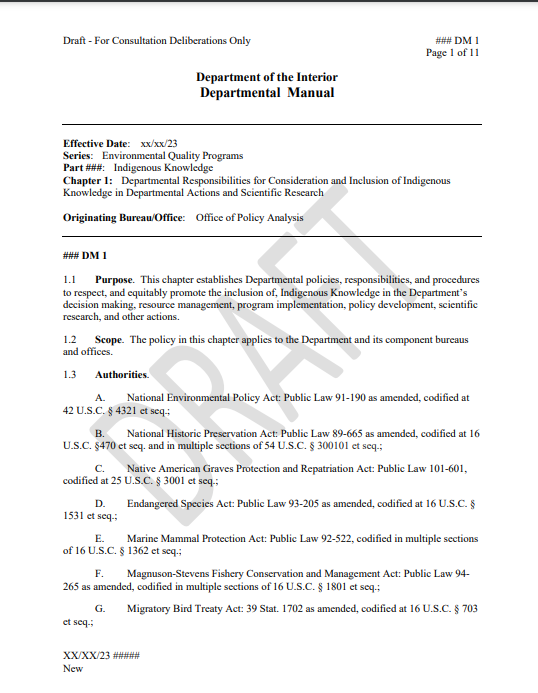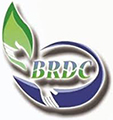Training Materials

Department of the Interior Departmental Manual
2023
Author(s): US Department of The Interior (.gov)
Indigenous Knowledge (IK) â a body of observations, oral and written knowledge, innovations, practices, and beliefs developed by Indigenous Peoples through interaction and experience with the environment. It is applied to phenomena across biological, physical, social, cultural, and spiritual systems. Indigenous Knowledge can be developed over millennia, continues to develop, and includes understanding based on evidence acquired through direct contact with the environment and long-term experiences, as well as extensive observations, lessons, and skills passed from generation to generation.

North Australian Remote BNH Training : Training Manual
2021
Author(s): Bush Fire and Natural Hazards CRC
This project aims to provide a ânext-generationâ training program that builds on the work that has gone before and leads to increasing levels of competence and confidence and, in its turn, resilience for their communities. The project is a direct response to north Australian stakeholder concerns about existing training; that it is inadequate for their needs.

Training Manual for Indigeneous People and Local Communities on The Convention on Biological Diversity
2022
Author(s): The Secretariat of the Convention on Biological Diversity
The IPBES Global Assessment Report on Biodiversity and Ecosystem Services emphasizes that âAt least a quarter of the global land area is traditionally owned, managed, used or occupied by indigenous peoples. These areas include approximately 35 per cent of the area that is formally protected and approximately 35 per cent of all remaining terrestrial areas with very low interventionâ.

Using Traditional and Indigeneous Knowledge for Disaster Risk Reduction
2022
Author(s): United Nations Office for Disaster Risk Reduction (UNDRR)
Traditional and indigenous knowledges offer a lens through which we can understand risk reduction and engagement better, enrich resilience building efforts and develop empowering solutions. Many sources of traditional knowledge are based on cognitive schemes that favour careful and integrative observation and adaptive learning over generations; this often goes hand in hand with a more holistic and ecologically viable approach, leading towards sustainable, democratic and inclusive DRR, response and recovery.
Gender in Adaptation Planning for the Agriculture Sectors
2019
Author(s): Nelson S , Hill C
The emphasis is on adaptation in agriculture, however the materials can be applied to planning for climate change adaptation in other sectors. In addition to this Guide for Trainers, there are companion PowerPoint templates that workshop organizers can tailor to their specific context.
Addressing Agriculture, Forestry and Fisheries in National Adaptation Plans â Supplementary Guidelines
2017
Author(s): Karttunen K,Wolf J , Garcia C , Meybeck A
The Guidelines aim to support developing countries in: i) reducing vulnerability of the agriculture sectors to the impacts of climate change by building adaptive capacities and resilience; ii) addressing agriculture in the formulation and implementation of NAPs; and iii) enhancing the integration of adaptation in agricultural development policies, programmes and plans.
Linking People for Quality Products: Sustainable Interprofessional Bodies for Geographical Indications
2017
Author(s): Damary P , Bernardoni P , Couillerot C , Perret A
The content and theory pages of this training manual set out the basic concepts, while the exercise sheets provide for participative activities. The trainer notes, together with the introduction, guide trainers in the preparation of tailored training in relation to the five steps of the virtuous circle.
Training Manual for Organic Agriculture
2015
Author(s): Gomez I , Thivant L , TECA Team â Research and Extension Division (DDNR) of the Food and Agriculture Organization of the United Nation (FAO)
Organic agriculture follows the principles and logic of a living organism, in which all elements (soil, plant, farm animals, insects, the farmer and local conditions) are closely linked to each other. Organic agriculture shares many techniques used by other sustainable agricultural approaches (e.g. intercropping, crop rotation, mulching, integration of crops and livestock).
Training Manual on Forests and Trees for Food Security and Nutrition
2020
Author(s): Food and Agriculture Organization of The United Nations
The overall objective is to create awareness and enable increased investment in the forestry sector for food security and nutrition in Tanzania. This training manual is also meant to serve as a useful tool for sharing and exchanging knowledge and experiences across different regions (within the country) and beyond.
Sustainable Development Goal 16 & Indigenous Peoplesâ Collective Rights to Land, Territories & Resources
2021
Author(s): Food and Agriculture Organization of The United Nations
In this paper, FAO shares experiences and proposes actions to advance towards the realisation of Indigenous Peoplesâ rights to land, territories and resources, urging the countries to protect Indigenous Peoplesâ rights as an avenue to achieve the SDG 16.



